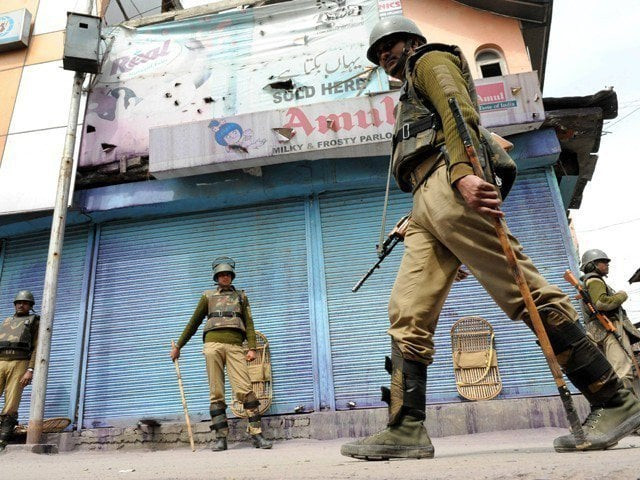Indian-held Kashmir tense as Burhan Wani's death anniversary looms
Civilians have played an increasingly active role in rebellion against Indian rule since Burhan Wani's death

A file photo of security forces in IOK. PHOTO: AFP
When government forces came to his village in the picturesque Himalayan region recently to raid a hideout, the teenager, who does not want to be named, threw himself into a hail of bullets to help the fighters escape.
Complete shutdown in Indian-held Kashmir against civilian killings
"I leapt in between a trapped rebel and soldiers who were shooting and took the bullets myself," he told AFP from his hospital bed in Srinagar, the main city in Indian-occupied Kashmir.
But since the charismatic rebel leader Burhan Wani was shot dead by security forces on July 8, civilians have played an increasingly active role in the rebellion against Indian rule.
The death of the dashing 23-year-old, who had built up a big following on social media as he posed with an AK-47, sparked a huge outpouring of grief in IOK. Nearly 100 civilians were killed in mass protests in the months that followed, most shot dead by security forces. Many more were blinded by the pellet guns used by government forces in the region, further exacerbating the divide between authorities and an already alienated civilian population.
Hospital authorities in Srinagar say they have seen a steady stream of injured civilians since July and treated more than 1,000 for 'horrific' eye injuries.
In parts of south IOK -- the epicentre of the renewed insurgency -- villagers began intervening in anti-rebel raids, throwing stones at government forces to create a distraction and give the rebels a chance to flee.
"It is a direct confrontation now," said Kashmiri historian Sidiq Wahid. "Public anger and defiance has reached levels never seen in Kashmir before."
IOK's separatist leaders -- most of whom have been either confined to their homes or jailed ahead of the anniversary -- have called for a week of protests from Saturday to mark Wani's death. Authorities have begun controlling people's movements and suspended mobile internet services in some areas.
One senior officer said police stations across south IOK were full of motorbikes seized to stop activists moving between villages.
India has deployed two additional army battalions -- about 2,000 troops -- to troubled regions in the southern IOK area. But some officials say the challenge now is to deal with public anger rather than the militant threat.
"The armed militants are not much of a challenge," one senior security official told AFP on condition of anonymity.
"Counterinsurgency operations have been intensified and we are eliminating them. But in absence of any political forces engaging the people, they (rebels) have galvanised the public sentiment against India."
Rising tension in Kashmir can destabilise South Asia: Maleeha Lodhi
Analysts say the oppressive rule in IOK has intensified public opposition, where nearly 100 youths joined the rebel ranks since Wani's death. Many have taken weapons from police and paramilitary forces during patrols.
Although he is still so weak he can only speak in a whisper, the wounded teen hopes he will soon be among them. "I am praying to find a weapon when I get out of here and join my brothers," he said from his hospital bed.



















COMMENTS
Comments are moderated and generally will be posted if they are on-topic and not abusive.
For more information, please see our Comments FAQ